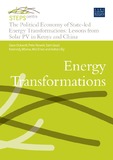The Political Economy of State-led Energy Transformations: Lessons from Solar PV in Kenya and China
| dc.contributor.author | Ockwell, David | |
| dc.contributor.author | Newell, Peter | |
| dc.contributor.author | Geall, Sam | |
| dc.contributor.author | Mbeva, Kennedy | |
| dc.contributor.author | Shen, Wei | |
| dc.contributor.author | Ely, Adrian | |
| dc.coverage.spatial | Kenya | en |
| dc.coverage.spatial | China | en |
| dc.date.accessioned | 2017-05-04T09:26:20Z | |
| dc.date.available | 2017-05-04T09:26:20Z | |
| dc.date.issued | 2017-05-02 | |
| dc.identifier.citation | Ockwell, D., Newell, P., Geall, S., Mbeva, K., Shen, W. and Ely, A. (2017) The Political Economy of State-led Energy Transformations: Lessons from Solar PV in Kenya and China, STEPS Working Paper 92, Brighton: STEPS Centre. | en |
| dc.identifier.uri | https://opendocs.ids.ac.uk/opendocs/handle/20.500.12413/12967 | |
| dc.description.abstract | Amid talk of the need for a low carbon ‘clean energy revolution’ to address the challenges of energy poverty and climate change, there is growing academic and policy interest in understanding the role of key actors that are expected to enable transitions and transformations towards a low carbon economy in a pro-poor way. Within the socio-technical transitions literature, there has been increased interest in “the state” as the primary actor with the responsibility, authority and capacity to address these issues. But understanding the role of the state in energy transformations requires an appreciation of context: what is possible given enormous differences in capacity and resources, autonomy and uneven access to different energy sources and technologies. Which technologies and energy systems receive support, whose energy needs get prioritised and which actors are charged with the responsibility for meeting energy needs are a function of very different decision-making processes, political systems and political economies. Taking the case of support to solar PV in China and Kenya, we develop a political economy analysis of state-led energy transformations which seeks to explore how different aspects of statehood impact upon the nature and prospects of the sorts of transformations now urgently required of energy systems. We do so by examining political economy dynamics in relation to: (i) the organisation of the state; (ii) the political nature of the state; and (iii) the state in the global political economy. This raises questions about the viability and desirability of generic prescriptions for “managed transitions” in light of such diversity in state forms and functions, the different ways in which they interact with energy systems and the evident limits of the sorts of transitions and transformations that states alone can steer, manage or impose. It thus speaks to broader debates about the politics of “care” vs. “control” in transformations to sustainability. | en |
| dc.description.sponsorship | ESRC | en |
| dc.language.iso | en | en |
| dc.publisher | ESRC STEPS Centre | en |
| dc.relation.ispartofseries | STEPS Working Papers;92 | |
| dc.rights | Users are welcome to copy, distribute, display, translate or perform this work without written permission subject to the conditions set out in the Creative Commons licence. For any reuse or distribution, you must make clear to others the licence terms of this work. If you use the work, we ask that you reference the STEPS Centre website (www.steps-centre.org) and send a copy of the work or a link to its use online to the following address for our archive: STEPS Centre, University of Sussex, Library Road, Brighton BN1 9RE, UK (steps-centre@ids.ac.uk). | en |
| dc.rights.uri | http://creativecommons.org/licenses/by-nc-nd/3.0/ | en |
| dc.subject | Climate Change | en |
| dc.subject | Environment | en |
| dc.subject | Industrial Development | en |
| dc.subject | Technology | en |
| dc.title | The Political Economy of State-led Energy Transformations: Lessons from Solar PV in Kenya and China | en |
| dc.type | Series paper (non-IDS) | en |
| dc.rights.holder | ESRC STEPS Centre | en |
| rioxxterms.funder | Default funder | en |
| rioxxterms.identifier.project | STEPS Centre | en |
| rioxxterms.version | VoR | en |
| rioxxterms.funder.project | 7360ec74-14f4-4420-af2a-8ca314d07ffe | en |
Files in this item
This item appears in the following Collection(s)
-
ESRC STEPS Centre [225]
Except where otherwise noted, this item's license is described as Users are welcome to copy, distribute, display, translate or perform this work without written permission subject to the conditions set out in the Creative Commons licence. For any reuse or distribution, you must make clear to others the licence terms of this work. If you use the work, we ask that you reference the STEPS Centre website (www.steps-centre.org) and send a copy of the work or a link to its use online to the following address for our archive: STEPS Centre, University of Sussex, Library Road, Brighton BN1 9RE, UK (steps-centre@ids.ac.uk).


